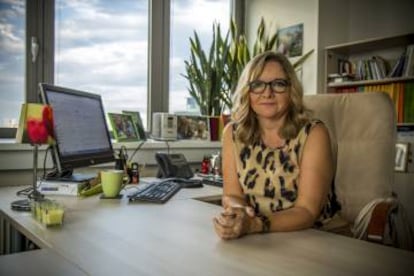Women in Slovakia: same work, more experience, less pay
The socially conservative country has reduced the gender pay gap but is still one of the most unequal nations in the European Union


Svetlana Fialova returned from her summer vacation feeling energized and ready to begin her third academic year as an associate professor at a university in Kosice, Slovakia. One day in September, shortly before classes were due to start, Fialova met up with an old friend who was going to join the faculty at her same school. After chatting about his passion, art, her future colleague then complained that he was going to be paid a low salary.
Fialova, 33, went quiet when she found out from him that the three new educators hired to start that year – all of them men – would be starting out on a higher salary than hers (€600 a month). When she got home, she went online to let off steam. “Same training, same amount of work or less, two years less holding the post... It’s not a myth that women earn less for doing the same work!” she posted on Facebook.
The new generation must lead the change
Svetlana Fialova, associate university professor
Fialova’s case is not an extraordinary occurrence in Slovakia. The central European country had the highest gender pay gap in the entire European Union when it joined the club in 2004 with 94% support from the population. The adoption of EU legislation and the constant raises in the minimum wage have improved the situation: the difference between hourly wages earned by men and women in Slovakia is now 19%, three points higher than the EU average but lower than Britain (21%) or Germany (22%), where a law went into effect last January forcing companies with more than 200 employees to reveal to its female employees how much their male counterparts make.
“The last thing I want to do is to harm my male colleagues, who are already in very precarious conditions. All I demand is what I am entitled to,” says Fialova, sitting inside her office at the Technical University of Kosice, the second-largest city in the country with a population of 250,000. During an interview as part of a trip sponsored by the European Parliament, this associate professor of visual arts noted that she only earns €120 above the minimum wage in Slovakia.
Days after she posted her impulsive comments on Facebook, Fialova filed a formal complaint and is still waiting for a reply. “The head of the department said it was no business of his. The dean said the same thing,” she says in a resigned tone.

As she unlocks her bicycle – the only one in sight – Fialova explains that even though there is a clear female majority in the student population, “the university is absolutely dominated by men. All the departments are headed by men.”
Fialova, who trained in London and Prague, also works as a figurative art designer on the side. Inside her personal study, which is packed with work that draws inspiration from a range of sources, including comic strips and old masters such as Albrecht Dürer, Fialova defends the introduction of gender quotas – a nearly taboo subject in Slovakian politics – in order to foment women’s professional and social development.
In the capital, Bratislava, Olga Pietruchova heads the Department for Gender Equality and Equal Opportunities at the Labor Ministry. After seven years on the job, Pietruchova holds that workplace inspections are proving key in fighting inequality, and she encourages female workers to report irregular situations.
“One of the biggest obstacles remains the occupational segregation of women,” she says. The fields of education, social work, healthcare and clerical work are female-dominated and defined by their precarious wages. Two-thirds of workers who earn the minimum wage are women.
Many women in this country are willing to get a lower salary just as long as they have a job. We lack the spirit to stand up for ourselves
Monika Uhlerova, Confederation of Unions of Slovakia
Pietruchova, 56, explains that the salary gap is much smaller in the cities – particularly Bratislava, which is very close to the Austrian border – than in rural areas, which are home to nearly half of the country’s five million inhabitants. “Irregular situations are most common in businesses located in small villages,” she notes. Pietruchova is pinning her hopes on new regulations that force employers to be more transparent about salaries in their job listings.
Sexist violence
Standing very near the ministry, Monika Uhlerova argues that the gender pay gap, which has been stuck at the same level for several years, cannot be reduced without new measures. “More daycare centers and more social benefits aimed at children and women. The state must make it easy to go back to work after having a child,” says Uhlerova, who is the vice-president of the Confederation of Unions of Slovakia. “Many women in this country are willing to get a lower salary just as long as they have a job. We lack the spirit to stand up for ourselves.”
Nearly one-third of single mothers are at risk of poverty, according to the European Institute for Gender Equality (EIGE). And even though the gender pay gap is now smaller, Slovakia remains one of the most unequal countries in Europe. An index drawn up by EIGE using 2015 data found that Slovakia ranks near the bottom, ahead of Romania, Hungary and Greece. The presence of women in politics is little more than symbolic, while in the private sector they do not hold positions of great responsibility.
Meanwhile, the rate of physical and sexual violence against women is among the highest on the continent. Slovakian teenage girls are the biggest targets of cyberbullying and revenge porn of all European adolescents, and gender stereotypes remain deep-seated in this post-communist society where, just like in Poland and Lithuania, religion plays a bigger role than in other European countries.
With a feminist movement that is not very active and gender equality low on the agenda of all the main politicians, progress for women in Slovakia is a slower affair than elsewhere in the EU. “The new generation must lead the change,” says Fialova. “I trust that one of my female students will one day be the first woman dean at Kosice”.
Women: 20% of deputies and 15% of executives
The progress made by Slovakia in reducing the gender pay gap has not resulted in greater female representation in top political, financial or business positions. The number of women in parliament has hovered around 20% (about 30 deputies) since the beginning of the 21st century, and none of the country’s eight regions had a single female governor until last year. The five female ministers in the current administration are a historical high: in early 2016, all 14 ministries were headed by men. The single notable exception was Iveta Radičová, who was prime minister of Slovakia between 2010 and 2012.
The Central Bank of Slovakia has no women at all on its board. And women hold just 15% of executive positions in the private sector, according to EIGE. In the communications sector, only one out of every five members of the boards at public broadcasters are female.
English version by Susana Urra.